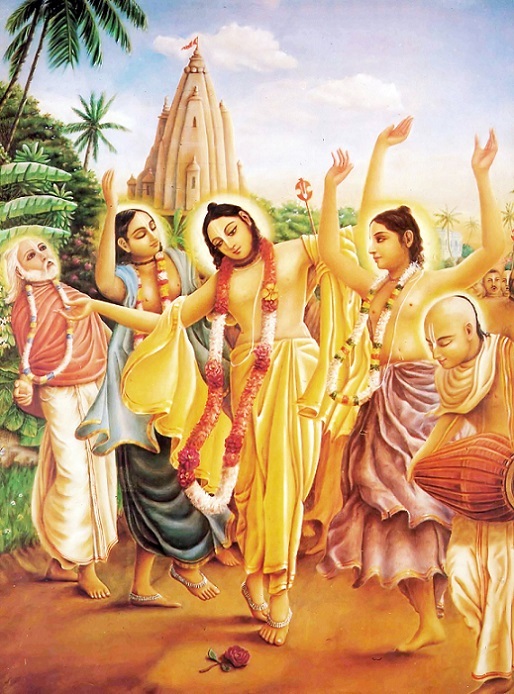harer nāma harer nāma
harer nāmaiva kevalam
kalau nāsty eva nāsty eva
nāsty eva gatir anyathā
In this Age of Kali there is no other means, no other means, no other means for self-realization than chanting the holy name, chanting the holy name, chanting the holy name of Lord Hari.
kali-kāle nāma-rūpe kṛṣṇa-avatāra
nāma haite haya sarva-jagat-nistāra
In this Age of Kali, the holy name of the Lord, the Hare Kṛṣṇa mahā-mantra, is the incarnation of Lord Kṛṣṇa. Simply by chanting the holy name, one associates with the Lord directly. Anyone who does this is certainly delivered.
dārḍhya lāgi’ ‘harer nāma’-ukti tina-vāra
jaḍa loka bujhāite punaḥ ‘eva’-kāra
This verse repeats the word 'eva' ['certainly'] three times for emphasis, and it also three times repeats 'harer nāma' ['the holy name of the Lord'], just to make common people understand.
'kevala'-śabde punarapi niścaya-karaṇa
jñāna-yoga-tapa-karma-ādi nivāraṇa
The use of the word 'kevala' ['only'] prohibits all other processes, such as the cultivation of knowledge, practice of mystic yoga, or performance of austerities and fruitive activities.
anyathā ye māne, tāra nāhika nistāra
nāhi, nāhi, nāhi—e tina ‘eva’-kāra
This verse clearly states that anyone who accepts any other path cannot be delivered. This is the reason for the triple repetition 'nothing else, nothing else, nothing else,' which emphasizes the real process of self-realization.
tṛṇa haite nīca hañā sadā labe nāma
āpani nirabhimānī, anye dibe māna
To chant the holy name always, one should be humbler than the grass in the street and devoid of all desire for personal honor, but one should offer others all respectful obeisances.
taru-sama sahiṣṇutā vaiṣṇava karibe
bhartsana-tāḍane kāke kichu nā balibe
A devotee engaged in chanting the holy name of the Lord should practice forbearance like that of a tree. Even if rebuked or chastised, he should not say anything to others to retaliate.
kāṭileha taru yena kichu nā bolaya
śukāiyā mare, tabu jala nā māgaya
For even if one cuts a tree, it never protests, and even if it is drying up and dying, it does not ask anyone for water.
ei-mata vaiṣṇava kāre kichu nā māgiba
ayācita-vṛtti, kiṁvā śāka-phala khāiba
Thus a Vaiṣṇava should not ask anything from anyone else. If someone gives him something without being asked, he should accept it, but if nothing comes, a Vaiṣṇava should be satisfied to eat whatever vegetables and fruits are easily available.
sadā nāma la-iba, yathā-lābhete santoṣa
eita ācāra kare bhakti-dharma-poṣa
One should strictly follow the principle of always chanting the holy name, and one should be satisfied with whatever he gets easily. Such devotional behavior solidly maintains one's devotional service.
tṛṇād api su-nīcena
taror iva sahiṣṇunā
amāninā māna-dena
kīrtanīyaḥ sadā hariḥ
One who thinks himself lower than the grass, who is more tolerant than a tree, and who does not expect personal honor yet is always prepared to give all respect to others can very easily always chant the holy name of the Lord.
ūrdhva-bāhu kari' kahoṅ, śuna, sarva-loka
nāma-sūtre gāṅthi' para kaṇṭhe ei śloka
Raising my hands, I declare, "Everyone please hear me! String this verse on the thread of the holy name and wear it on your neck for continuous remembrance."
prabhu-ājñāya kara ei śloka ācaraṇa
avaśya pāibe tabe śrī-kṛṣṇa-caraṇa
One must strictly follow the principles given by Lord Caitanya Mahāprabhu in this verse. If one simply follows in the footsteps of Lord Caitanya and the Gosvāmīs, certainly he will achieve the ultimate goal of life, the lotus feet of Śrī Kṛṣṇa.
(Caitanya-caritāmṛta Ādi-līlā, Texts 17.21-33)
.

